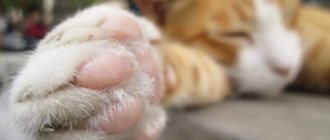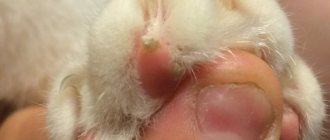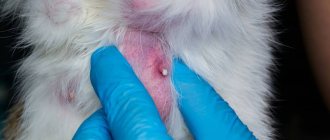Coughing is a protective reaction of the cat’s body from foreign objects that enter the respiratory tract, esophagus or stomach. Coughing can also be caused by hairballs in the stomach, inflammatory processes in the respiratory system, attacks of allergies or bronchial asthma.
If the owner notices that the cat is choking and coughing, as if it has choked, immediate measures must be taken to save the animal from suffocation. Let's find out why a cough occurs and how to independently help your pet before the veterinarian arrives.
Mechanism of cough development
A periodically occurring cough in a cat may indicate the development of inflammatory processes in the respiratory system, which require long-term treatment under the supervision of a veterinarian. It can also occur when trying to get rid of hairballs that accumulate in the animal’s stomach.
However, if the cat spontaneously begins to cough, wheeze, stretch out and press itself to the floor, this most often indicates ingestion or inhalation of small foreign objects. In this case, the animal must be quickly assisted or taken to the clinic without delay.
A cough is a strong, accelerated exhalation through the mouth, which occurs due to a sharp contraction of the muscles of the respiratory tract as a result of irritation of the receptors. In this way, the cat's respiratory tract is freed from mechanical substances that impede the movement of air along the airways.
The cough algorithm consists of the following stages:
- take a deep breath for no more than 2 seconds;
- reflex contraction of the smooth muscles of the larynx, which closes the glottis;
- increased tone of the bronchial muscles;
- sharp contraction of the abdominal muscles;
- opening of the glottis;
- a powerful exhalation that expels foreign agents.
Types and symptoms of cough in cats
The classification of cough in cats is described in detail in the table.
| Characteristics of cough | Degrees and types of cough manifestations |
| Force | slight cough; hacking cough |
| Form depending on duration | acute (less than 14 days); prolonged (from 14 to 45 days); chronic |
| Timbre | silent; voiced; deaf; hoarse; hoarse; barking |
| Presence of discharge | dry; wet |
| Character of sputum | serous; slimy; purulent; mixed with blood |
| Development time | constant; seasonal |
Symptoms that most often accompany coughing in cats include:
- discharge from the nasal cavity;
- vomit;
- wheezing.
The nature of the cough helps specialists make the correct diagnosis, identify the causes and prescribe appropriate treatment for a coughing cat.
What kind of cough can a kitten have?
The veterinary field distinguishes the following types of cough in a kitten:
- According to its duration, cough can be divided into chronic and acute;
- If we talk about the strength of cough, then veterinary doctors note the following types: mild, debilitating, with or without gagging;
- If we take the nature of the cough, then it is dull and loud;
- They also distinguish between exclusively morning and evening coughs, and also only summer or only spring coughs.
All these types of cough do not need to be dealt with independently, but rather in consultation with a veterinarian.
In case of asthma, delaying consultation can have negative consequences for the animal.
Also, when a pet coughs, it sneezes. The main reasons that a kitten is sneezing and coughing may have its roots in decreased immunity. Yes, often cats’ immunity decreases not quickly, but slowly, this is also a kind of danger. Remember that those bacteria that begin to multiply rapidly, when the animal’s immunity level drops, may not come out immediately or quickly; sometimes it can be purulent discharge from the animal’s mouth, or some other suppuration. If you do not take action in time, you may notice how your pet’s eyes fester.
Main causes of cough in cats
Veterinary experts identify 6 main causes of cough in cats.
- Bronchial asthma. This is one of the types of allergies that occur in a cat to foreign components that can be contained in dust, pollen, hair from other pets, dead particles of human skin, as well as in medications and chemicals.
- The presence of foreign objects in the upper respiratory tract, esophagus or stomach.
- Pathologies of the cardiovascular system.
- Helminthic infestations. During migration, Toxocara larvae enter the lungs. This most often occurs in young animals due to untimely deworming after weaning. In this case, the kitten coughs heavily and may vomit a foamy mass in which parasites are found. The cat may also cough constantly due to the presence of heartworms in the pulmonary arteries. These thin, long helminths parasitize the heart, pulmonary artery and small capillaries. They clog blood vessels, which causes frequent severe coughing, vomiting, shortness of breath, loss of appetite, and in case of severe infestation, convulsions and death.
- Infectious diseases of the upper respiratory tract. The most common diseases include herpes, rhinotracheitis and calicivirus.
- Pneumonia. The etiological factors for the occurrence of pneumonia in cats are pathogenic bacteria, viruses, microscopic fungi, as well as external factors such as hypothermia, eating cold food, and keeping the animal in unsanitary conditions.
- Malignant tumors in the respiratory organs.
Important! Among infectious agents, a special place is occupied by the pathogenic bacterium Bordetella bronchiseptica, which causes bordetellosis. Most often, this disease is transmitted by airborne droplets when cats are kept in crowded conditions in nurseries. The infection is also spread by stray cats, which can infect free-roaming pets.
If the cat is coughing heavily and breathing heavily, then the cause of this condition may be pneumo- or hydrothorax, caused by the penetration of air or liquid into the chest cavity.
Diagnosis of the condition
The multiplicity of causes that can cause cat cough makes it very difficult to diagnose cats. Therefore, the veterinary specialist consistently conducts a series of studies, including:
- collection of anamnestic data;
- inspection;
- palpation;
- percussion;
- auscultation;
- general and clinical blood test;
- radiography;
- coprogram for identifying intestinal helminth eggs.
If it is not immediately possible to determine the reason why the cat cannot cough, the veterinarian will prescribe additional laboratory and instrumental tests.
Note! Only large veterinary clinics can afford additional research, and the cost of these services is quite high. Therefore, it is advisable to carry them out more often for such high-pedigreed “expensive” cats as Sphynx, Maine Coon, Peterbald, Scottish Fold and others.
Specific additional studies that will help determine exactly why a cat is coughing with wheezing include:
- sputum analysis for the presence of viral agents and their identification;
- fluoroscopy of the esophagus using a contrast indicator;
- endoscopy of the upper respiratory tract and esophagus;
- bronchoalveolar lavage (performed under general anesthesia).
If the doctor suspects that the cat cannot cough due to the development of pathology of the cardiovascular system, the doctor will prescribe an ECG or ultrasound of the heart.
How to treat cat cough
If a cat is coughing, it can be treated at home only after being examined at a veterinary clinic, making an accurate diagnosis and prescribing appropriate therapy.
You should not self-administer cough suppressants before visiting a doctor, as this may change the clinical picture of the disease and make it difficult to determine the cause of the pathology.
Important! If the cat is coughing and wheezing, as if he is choking, then you should not take any independent action. It is better to quickly take your pet to the hospital or call a doctor at home. Delay can also be fatal when the cat wheezes, trying to burp, but only spits up saliva or foamy liquid.
If a cat coughs due to an infectious disease of viral etiology, the doctor prescribes:
- antibacterial drugs (Amoxisan, Sinulox, Tsiprovet) to prevent the development of secondary bacterial infections;
- mucolytic and expectorants (Bromhexine, licorice extract);
- immunomodulators (Cycloferon, Fosprenil, Maxidin);
- globulin Vitafel;
- intravenous injections of Ringer-Locke solution or saline with 5% glucose (to prevent dehydration when refusing food).
If the cough is accompanied by wheezing and the cat coughs while stretching its neck, then the cause may be pneumonia or another inflammatory process in the respiratory system. In this case, antibiotics are first prescribed. And to relieve coughing, the cat should be given antispasmodics, mucolytics and expectorants.
If a cat's cough is accompanied by vomiting, this often indicates helminthiasis. In this case, anthelmintic drugs are prescribed (Pyrantel, Prazicide, Drontal, Milbemax). Despite the fact that these medications are sold in pharmacies without a prescription, you should not use them yourself if your cat wheezes and tries to burp.
In case of severe infestation, an incorrectly selected dosage can lead to excessive activity of parasites and lead to suffocation. Illiterate actions by owners can also lead to intestinal rupture or excessive intoxication in small kittens.
If the reason that the cat is coughing and stretching its neck, as if choking, is trichobezoars, then the doctor will prescribe special pastes and gels to remove or dissolve hairballs in the stomach.
If a cat coughs and wheezes with its tongue hanging out, this may indicate an attack of bronchial asthma. You can quickly relieve an attack with:
- glucocorticosteroids (Hydrocortisone, Prednisolone, Dexamethasone, Fluocinolone);
- bronchodilators (Theophylline, Atropine);
- antibiotics (if there is a threat of infection by pathogenic bacteria).
Important! Self-administration of glucocorticosteroid and bronchodilator drugs to treat Sphynxes and other cats when they cough while stretching their necks can lead to overdose, complications and the development of side effects. Therefore, you should not put your pet’s life at risk; you must urgently take him to the clinic.
The reason that the cat is coughing, wheezing, as if he is choking, may be a heart attack, which develops in the cat as a result of a hidden pathology of the cardiovascular system. In this case, any independent treatment is unacceptable.
You should immediately call the clinic, call a veterinary specialist to your home and get a recommendation on the actions that need to be taken before his arrival.
Drug therapy
Medicines for cough treatment are selected only by a doctor in combination with other drugs that eliminate the underlying disease. Self-medication can hide the signs, but not lead to a complete recovery of the patient.
There are two types of cough medicines:
- Antitussives . To block the reflex function.
- Expectorants . To liquefy mucus and remove it from the body (does not eliminate the cough itself).
An important condition is to follow the dosage and recommendations for administration: time of day, number of times, on an empty stomach or after meals. If your pet is coughing, and even more so, it is accompanied by frightening symptoms (heavy breathing, lack of air, refusal to eat, etc.), rush to the doctor, these may be signs of a serious illness. And never refuse preventive vaccinations and regular deworming.
How to understand that a cat is not just coughing, but choking
If a cat coughs, wheezes and at the same time stretches out, pressing her whole body to the floor, then in 99% of cases this indicates that a foreign object has entered the esophagus or respiratory tract. When a cat coughs as if he is choking, you should not do anything on your own. You should immediately take your pet to the clinic.
Sometimes the cat gags and coughs, as if he wants to vomit, but attempts remain to no avail. This may indicate that the pet is unable to get rid of a large trichobezoar in the stomach on its own.
If the cat coughed, as if she was choking, but quickly came to her senses, then there is no reason to worry, as she could simply have choked.
How to help a cat who is choking
If, after eating fish or tubular bones, the cat sticks out its tongue, coughs, wheezes, or simply sits with its mouth slightly open, then there is a high probability that a sharp bone is stuck in its throat or esophagus.
If you have experience with animals, you can try to remove it yourself. But this can only be done if the bone is clearly visible in the oral cavity. To do this, you need to secure the cat. Then ask an assistant to hold the animal and try to open the pet's mouth wide.
The next step is to remove the bone using tweezers.
If the cat coughs, wheezes, or sticks out its tongue and makes wheezing sounds, but upon examination a foreign object cannot be detected, then the animal should be taken to the doctor immediately.
So what to do if your kitten is coughing and sneezing?
When your animal begins to cough frequently, and you get the impression that he is about to vomit, then the right decision would be to consult a veterinarian. If necessary, have the kitten have all the appropriate tests taken. It will depend on you, as his owner, how possible it will be to organize a gentle and calm rest regime for him.
If you
gave your pet some medications before going to the veterinarian , then in order to avoid any confusion, just say so right away, otherwise an erroneous diagnosis may be made, and no one needs this.
Preventive measures
To minimize the risk of a hoarse cough in cats, you need to adhere to the following rules:
- promptly vaccinate the animal against infectious diseases;
- carry out regular treatments against helminths and skin parasites;
- brush the hair of representatives of long-haired breeds daily;
- periodically feed gels and pastes to remove hair from the stomach;
- prevent pets from hypothermia;
- strictly observe the rules of cat hygiene and ensure high-quality living conditions;
- Do not feed your cat raw river fish and tubular bones.
If, however, a situation arises in which the cat begins to cough, wheeze and cling to the floor, then you should immediately go to the veterinary clinic. Specialists will quickly find out the causes of these symptoms and provide qualified assistance.










